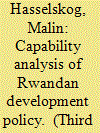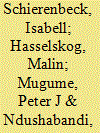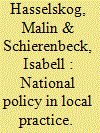|
|
|
Sort Order |
|
|
|
Items / Page
|
|
|
|
|
|
|
| Srl | Item |
| 1 |
ID:
157714


|
|
|
|
|
| Summary/Abstract |
This article provides a capability analysis of Rwandan development policy. It is motivated by impressive progress on human development indicators in combination with highly centralised policymaking, giving ambiguous signs regarding a capability approach. It is based on extensive original empirical material, along with large numbers of official documents and academic sources. The analysis is structured around three issues that concern the relation between individual agency and government policy, and that are debated among capability scholars as well as in relation to Rwandan development policy: participation, transformation and paternalism. The finding that Rwandan development policy reflects an approach very different from a capability approach is not surprising, but establishes that the assumed link between human development indicators and the capability approach needs to be questioned. This brings our attention to shortcomings in any quantitative measurements of development, or in the use of and importance attached to them, as well as to the problem of assuming that certain outputs go hand in hand with certain processes. While this is valid for contexts far beyond Rwanda, it also sheds light specifically on the polarisation that exists in the scholarly debate on Rwanda
|
|
|
|
|
|
|
|
|
|
|
|
|
|
|
|
| 2 |
ID:
153142


|
|
|
|
|
| Summary/Abstract |
A paradox in current international development cooperation is comprised by the simultaneous insistence on national ownership and far-reaching donor involvement through policy dialogue. In order to better understand this combination of a strong ownership ideal and extensive donor presence, this article explores how national and external actors portray the process of formulating and revising development policies and programmes in an aid recipient country. The study is based on original empirical material from national as well as external actors involved in the aid relation in Rwanda which, despite heavy aid dependence, is known to have achieved relative policy independence. Analysed in relation to three strands of critical thought in previous research, findings show that, in Rwanda, the very top political leadership is actively involved in initiating and formulating policies; that there are instances of negotiation as well as strong disagreements between national and external actors; and that, rather than donors seeking to retain control, Rwanda is depicted as setting its own agenda and effectively managing its donors. The paradox of an ownership ideal combined with donor involvement is thus met by an apparent tendency among national as well as external actors to emphasise national ownership while toning down donor influence.
|
|
|
|
|
|
|
|
|
|
|
|
|
|
|
|
| 3 |
ID:
139235


|
|
|
|
|
| Summary/Abstract |
Far reaching decentralisation reform has been launched in Rwanda, intended to contribute to socioeconomic development as well as to reconstruction and reconciliation. While the reform is well in line with the international trend of a ‘local turn’, the Rwandan government makes a point of not letting donors or other external actors set the agenda. Determined to formulate its own policies, thus claiming ‘national ownership’, it has, within the frame of decentralisation, launched several development programmes to be locally implemented and to promote local participation and downward accountability. However, the reform and programmes are designed and decided upon in a top-down manner by the central national leadership. This article analyses local experiences and perceptions of decentralisation and related programmes, and investigates whether and how such reform provides for local participation and downward accountability. It concludes that nationally owned reform is not necessarily an alternative to externally initiated and driven reform; neither local participation nor downward accountability was enhanced. The study builds on official policy documents and semi-structured interviews with Rwandan residents and local officials.
|
|
|
|
|
|
|
|
|
|
|
|
|
|
|
|
|
|
|
|
|